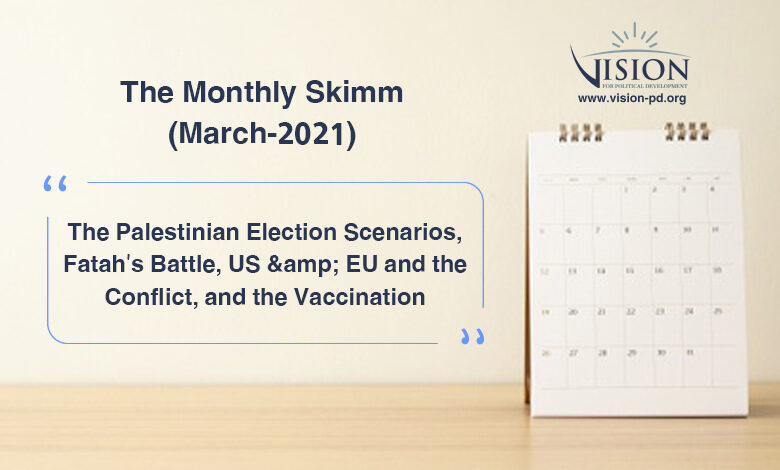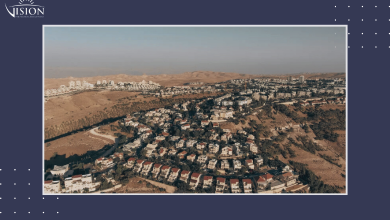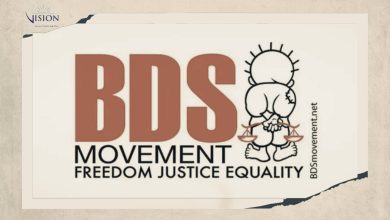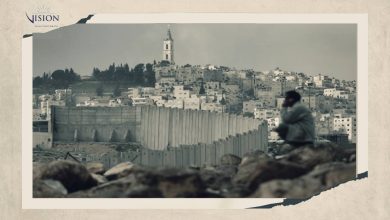The Monthly Skimm (March, 2021): The Palestinian Election Scenarios, Fatah’s Battle, US & EU and the Conflict, and the Vaccination

Mohammed Hasan: Researcher in Political Science
The Palestinian Elections
In his analysis for the Washington Institute article entitled “If Palestinian Elections Proceed, Hamas May Have the Upper Hand,” Ghaith al-Omari is expecting that Abbas will postpone the vote in the hypothetical elections due to internal divisions in Fatah. While Hamas is manifestly unified, Fatah is dealing with complications and divisions. Although parrellells exist between the present election scenereo and 2006, an election law serves to thwart single party domination this time(al-Omari, 2021).
According to “Michael Milstein” (Milstein, 2021), There are three main problems that may threaten the upcoming Palestinian elections:
- The claim that the commitment to free political prisoners made by both Hamas and Fatah is not being actualized.
- The tension produced by the Palestinian Authority’s censuring of Hamas for aiming to get involved in the PA-Egyptian deal for developing Gaza’s Marine gas field.
- Holding the elections in Jerusalem.
Milstein (Milstein, 2021) also discussed the different Scenarios that may play out regarding the elections:
- An internal political eruption: this would happen if an internal tension between Hamas and Fatah came to pass due likely to mutual assertions that the other side failed to realize their duties. If this hypothetical were to happen sooner rather than later it could potentially facilitate Abu Mazen’s efforts in participating in the peace process with Israel.
- Failure caused by Israel: this can happen as a result of a concentrated push from Israel against Hamas in the West Bank. Furthermore, Israel could directly disallow the vote.
- Fatah Victory: This seems unlikely to exist, particularly in the midst of these divisions but a Fatah win would assuredly gain support from Israel and U.S. allies.
- Hamas Victory: This scenario may lead to the “Algerian scenario” in which Abbas would not accept the electoral results. If that happened, clashes between Hamas and Fatah in the West Bank would likely occur.
- Unity Government: this would occur in the event of an electoral tie, or if Hamas agreed to partner in governance rather than unilaterally rule. In this case, Hamas would experience both internal and external pressure to recognize agreements between PA and Israel
The Palestinian Elections as a Battle within Fatah
“The planned Palestinian elections are really a battle within Fatah” Pinhas Inbari asserts in his opinion piece published in the Jerusalem Center for Public Affairs (Inbari, 2021). Inbari is arguing that there is no one Fatah. Fatah is two factions: The “First Fatah” consists of the PLO leaders who returned back from the Oslo Accords, and most of them are originally from the cities and villages of the 1948 Nakba area; They are the “Tunisian Tanzim”.
The “second Fatah” consists of those who live in the West Bank and they have little attachment to the ‘Nakba;’ these are the local ‘Tanzim’. Mahmud Abbas represents the “Tunisian Tanzim” role and his conflict is with the local ‘Tanzim’s’ leaders such as Marwan al-Barghouthi, Rojoub, and Dahlan. If anyone from the “Local Tanzim” defeated Mahmud Abbas, this would mean the end of the Tunisian role of Fatah. It is important to mention that this internal battle within Fatah will eventually go in a certain direction with or without the elections.
How Would Israel Work to Curb the “Rapprochement between Fatah and Hamas”?
In the attempt to address the question on whether Israel is ready for a possible rapprochement between Fatah and Hamas (Tzoreff, 2021)? Tzoref & Eran discussed an imagined Hamas election win in the hypothetical elections as a consequence of Hamas partnering with Fatah in a unified list against the organizational division confronting Fatah. They recommend that the Israeli government should take proactive steps, such as initiating the US administration not to accept any government that includes Hamas before recognizing the entire agreement between Israel and the PA. The writers warn Israel that the changes in political scenes can help Hamas and Fatah rapprochement. Not only should the US be pushed to oppose a legitimatized Hamas-partnered administration, but also “regional powers” and the EU.
Insights from Israeli Last Elections
There are some important matters must be highlighted regarding the last Israeli elections (Mekelberg, 2021):
- Ultra-right’s success (this side includes Rabbi Kahane’s disciples) is seen as a warning about the future of Israel’s democracy.
- The relative success of the two Israeli social-democratic parties, namely, Labour and Meretz. Their success is seen as base for building a more progressive agenda regarding the dominant politics in Israel in the context of the right’s dominance of the political contest.
- There is an Israeli public perception that their vote would not matter.
COVID19 Vaccination Between the Israelis & Palestinians:
Palestinians are treated as an independent country regarding the COVID-19 vaccination against COVID19. The Israelis have not taken their responsibility as the occupying power on Palestinian land. While the Palestinians are suffering from the shortage of medical supplies and the inability to get the vaccination, 55% of the Israelis above 16-year-old have been vaccinated, making it the world vaccine leader with an immunization rate of four times the United States (Varadarajan, 2021).
American Exceptionalism towards Israel is Getting Changed
In the article entitled “Challenging Israel’s Exceptionalism in American Politics”, Elgindy discussed how bipartisan, unconditional support for the Israelis is changing, whereby the Democrats, particularly the left-leaning members, became vocal in supporting Palestinian rights and more obvious about their dissatisfaction with unconditional support of Israel (Elgindy, 2021).
Biden, Transatlantic Cooperation and Israel
“Transatlantic Cooperation and the Implications for Israel” (Stein, 2021) assumes that the Biden Administration would not oppose Israeli policy which seeks to enhance normalization between Israel and the countries in the region, but it would slow it down. America’s promotion of the Transatlantic Cooperation can influence the Israeli position. Regarding the Iran nuclear deal, the US and EU seek to further the deal to Israel’s chagrin as the deal is considered a threat to national security.
With regard to the Israeli-Palestinian conflict, the Israel policies that contravene international law would be limited; particularly the policies in East Jerusalem and the West Bank. Countries that signed the normalization agreement with Israel would adopt Biden’s approach in “watching” Israeli practices closely (Stein, 2021).
EU and the Conflict
In his attempt to assess EU diplomacy towards the Israeli-Palestinian conflict one year on, Przemyslaw Osiewicz maintains that the EU would maintain its previous orientation (Osiewicz, 2021); it would support the peace process ostensibly leading to a two-state solution. In spite of the “positive sentiments declared by the EU regarding the normalization wave between some Arab countries and Israel, the normalization itself does not address the conflict between the Palestinians and the Israelis.
References
al-Omari, G. (2021). If Palestinian Elections Proceed, Hamas May Have the Upper Hand. Retrieved from The Washington Institute: https://www.washingtoninstitute.org/policy-analysis/if-palestinian-elections-proceed-hamas-may-have-upper-hand
Elgindy, K. (2021). Challenging Israel’s exceptionalism in American politics . Retrieved from Responsible Statecraft : https://responsiblestatecraft.org/2021/03/22/book-review-challenging-israels-exceptionalism-in-american-politics/
Inbari, P. (2021). The Planned Palestinian Election Is Really a Battle within Fatah . Retrieved from Jerusalem Center for Public Affairs: https://jcpa.org/the-planned-palestinian-election-is-really-a-battle-within-fatah/
Mekelberg, Y. (2021). Israeli election produces yet another stalemate. Retrieved from Chatham House: https://www.chathamhouse.org/2021/03/israeli-election-produces-yet-another-stalemate
Milstein, M. (2021). Palestinian Elections: How Real, and with What Results. Retrieved from the Washington Instute: https://www.washingtoninstitute.org/policy-analysis/palestinian-elections-how-real-and-what-results
Osiewicz, P. (2021). The EU’s diplomatic head and the Israeli-Palestinian conflict one year on. Retrieved from Middle East Institute : https://www.mei.edu/publications/eus-diplomatic-head-and-israeli-palestinian-conflict-one-year
Stein, S. (2021). Transatlantic Cooperation and the Implications for Israel. Retrieved from The Institute for National Security Studies: https://www.inss.org.il/publication/transatlantic-cooporation/
Tzoreff, Y. (2021). Possible Rapprochement between Fatah and Hamas: Is Israel Ready? . Retrieved from The Institute for National Security Studies: https://www.inss.org.il/publication/fatah-hamas/
Varadarajan, T. (2021). How Israel Became the World Vaccine Leader. Retrieved from Wall Street Journal: https://www.wsj.com/articles/how-israel-became-the-world-vaccine-leader-11615576463
The Monthly Skimm is a narrative brief of political opinions and analysis conducted by think tanks about the Palestinian-Israel conflict.





